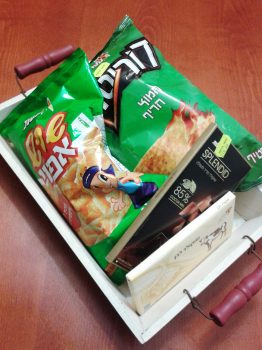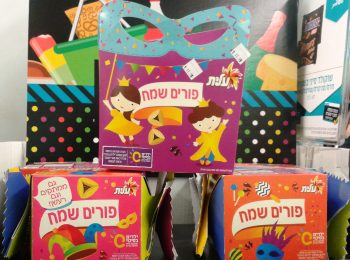Purim Basket Posted by Ayana on Mar 10, 2017 in Uncategorized
Purim (פּוּרִים) is a fun festival, probably the kids` favorite one. The holiday of פּוּרִים commemorates the saving of the Jews from Haman, who planned to kill them back in the Persian Empire during the fourth century BCE. Although it happened many years ago, we still celebrate it happily. Who wouldn’t enjoy a festival that includes costumes, alcoholic beverages, traditional food, and gifts?
The story of the deliverance of the Jews and the defeat of Haman, as it recounted in The Book of Esther, includes some interesting commandments. One of them is the Purim basket (מִשְׁלֹוחַ מָנוֹת). מִשְׁלֹוחַ מָנוֹת is an essential part of the observance of פּוּרִים, as it appears in the bible:
עַל כֵּן הַיְּהוּדִים … עֹשִׂים אֵת יוֹם אַרְבָּעָה עָשָׂר לְחֹודֶשׁ אֲדָר, שִׂמְחָה וּמִשְׁתֶּה וְיוֹם טוֹב; וּמִשְׁלֹוחַ מָנוֹת אִישׁ לְרֵעֵהוּ … וְהַחֹודֶשׁ אֲשֶׁר נֶהְפַּךְ לָהֶם מִיָּגוֹן לְשִׂמְחָה, וּמֵאֵבֶל לְיוֹם טוֹב; לַעֲשׂוֹת אוֹתָם יְמֵי מִשְׁתֶּה וְשִׂמְחָה, וּמִשְׁלֹוחַ מָנוֹת אִישׁ לְרֵעֵהוּ, וּמַתָּנוֹת לָאֶבְיֹנִים.
[אסתר ט, יט, כב]
That is why Jews … observe the fourteenth of the month of Adar as a day of joy and feasting, a day for giving presents to each other … and as the month when their sorrow was turned into joy and their mourning into a day of celebration. He wrote them to observe the days as days of feasting and joy and giving presents of food to one another and gifts to the poor.
[The Book of Esther, chapter 9, 19-22]
The commandment in Hebrew declares: מִשְׁלֹוחַ מָנוֹת אִישׁ לְרֵעֵהוּ.
Let’s break it down:
- מִשְׁלֹוחַ means a delivery.
- מָנוֹת means dishes. Not the serving containers made of china, ceramic or glass, but the
edible substance inside them.
- אִישׁ means man, person, adult.
- רֵעַ means friend. לְרֵעֵהוּ means to his friend.
So מִשְׁלֹוחַ מָנוֹת אִישׁ לְרֵעֵהוּ basically means a delivery of dishes from a person to his friend.
The single and plural distinction takes essential place in this edict exegesis. Jewish scholars affirmed that a person must send a gift, containing at least two dishes, to at least one friend, to observe the commandment. The words מִשְׁלֹוחַ and רֵעַ appear in the single form, hence a gift to one friend is enough. The word מָנוֹת however appears in its plural form, henceforth the gift should contains at least two dishes.
Rabi Moses Ben Maimon (a famous influential Jewish scholar from the 12th century) announced in his book that two dishes of food to one friend is compulsory, but sending more gifts to more friends is even better. And so we do today. The religious people send many gifts of food to friends, neighbors and family. Some of them add wine to the gift, so the receiver can observe another commandment of the holiday: to feast and drink. The non religious people usually leave this commandment to the kids. The kids of course prefer gifts of candies and sweets, which they deliver to friends and soldiers. They don’t know which soldier will receive their מִשְׁלֹוחַ מָנוֹת, but every year they bring one extra basket to school, to which they attach a short letter to the anonymous soldier. A special non-profit organization sends the gifts to the IDF soldiers, and they in return send a short thank you letter to the kids.
Soldiers are not the only one that should enjoy such a present in פּוּרִים. Most of today Rabies exhort their followers to send מִשְׁלֹוחַ מָנוֹת to new immigrants, the sick, and elderly persons. Because one of the מִשְׁלֹוחַ מָנוֹת purposes is to ensure that everyone will have enough food to feast at פּוּרִים. The second purpose is to spread joy and brotherhood among our people. A basket full of delicacies can cheer everyone up, and a gift always brings people together.
Another way to cheer up is to watch this funny supermarket chain’s commercial, that was broadcasted two years ago during Purim:
Text vocabulary
Purim = פּוּרִים
The Book of Esther = מְגׅילַת אֶסְתֵּר (me-gi-lat ester)
Deliverance = גְּאֻלָּה (ge-u-la)
Commandment = מִצְוָה (Mitzvah)
Purim basket = מִשְׁלֹוחַ מָנוֹת (mish-lo-ach ma-not)
Delivery = מִשְׁלֹוחַ (mish-lo-ach)
Dish = מָנָה (ma-na)
Dishes = מָנוֹת (ma-not)
Person = אִישׁ (ish)
Persons = אֲנָשׁׅים (a-na-shim)
Friend (archaic use) = רֵעַ (re-ah)
Friend (modern use) = חָבֵר (ha-ver)
Friends = חָבֵרׅים (ha-ve-rim)
** For 3 DIY Purim basket read this article. **
Keep Calm and Learn Hebrew

Build vocabulary, practice pronunciation, and more with Transparent Language Online. Available anytime, anywhere, on any device.





